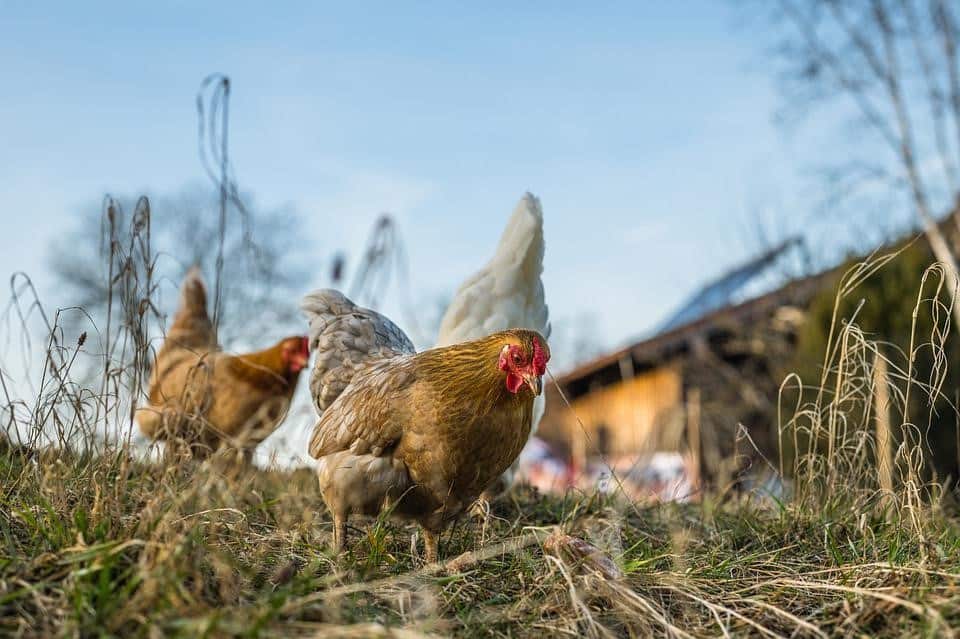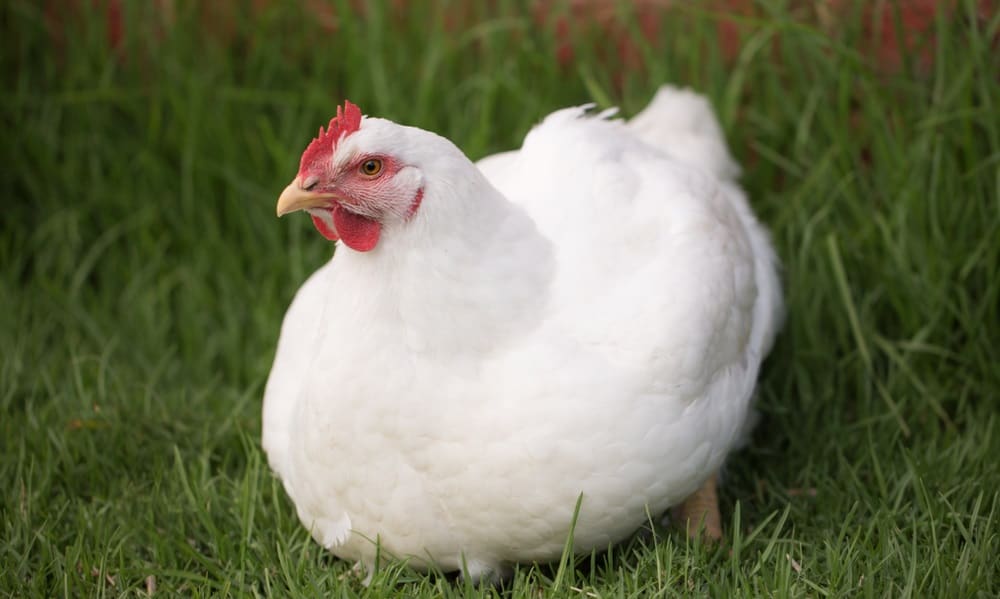Commonly known as water belly in chickens, Ascites is a condition that presents itself as a swollen abdomen in chickens. While there are many other reasons why chickens might have swollen bellies, Ascites is often the go-to culprit. Learn about water belly in chickens, symptoms to watch out for, and treatment.
Water Belly in Chickens
What is Ascites in chickens? Ascites is a condition that causes a yellowish-colored fluid to accumulate in the chicken’s peritoneal or abdominal cavity. While this fluid comes from the liver, Ascites syndrome commonly occurs due to pulmonary hypertension syndrome.
Whenever your chicken has pulmonary hypertension syndrome, the body won’t circulate oxygenated blood as fast as it should. As a result, the heart goes into overdrive, trying to compensate for this deficit. This, in turn, puts extra stress on the chicken’s liver, which starts leaking fluid into the chick’s abdomen.
Ascites doesn’t seem to have a single cause or the main cause. It often occurs when a combination of the environment, genetics, and flock management strategies coincide.
Ascites isn’t a contagious disease and therefore doesn’t run through an entire flock of chickens like coccidiosis. However, it’s worth investigating the main causes as environmental circumstances come into play, and this condition might affect more than just one hen in the chicken coop at a time.
Ascites, however, isn’t that common. At least not in most backyard poultry, such as ducks or laying hens. It’s a condition most common in meat birds and fast-growing broilers.
Other Causes of Swollen Bellies in Chickens
Ascites is often the culprit behind many swollen chicken bellies, but it’s not the only possible cause. Several other conditions could cause chicks to have swollen bellies. These include:
- Marek’s disease, which tends to cause tumors,
- Egg binding or peritonitis
- Fatty liver syndrome or obesity
Water Belly in Chickens Symptoms
Chickens suffering from Ascites will often present with the following symptoms.
- Swollen abdomen: This often feels squishy to the touch and is soft and distended. It also looks full of fluid.
- Red skin: This can often be found around the abdomen, which in many cases, will be missing feathers.
- Strained walk: The infected bird will waddle as it walks.
- Labored breathing: The infected bird will often struggle to breathe and look like it is panting. This mostly occurs because the bird’s body is craving oxygen.
- Colored wattle: The comb or wattle will have a blue or purple tint. As the chicks’ bodies struggle for oxygen, it will prioritize the more vital organs, relegating non-vital organs such as wattles to the bottom of the list. The blue, purplish color occurs due to a lack of oxygen in these extremities.
- Lethargy and lack of appetite: The infected bird will always appear tired and won’t feed at the same rate as the others. In some cases, it could go an entire day without food. This also means that it can experience stunted growth as a result. How long can chickens go without food
Common Causes of Ascites or Chicken Water Belly
While there are many contributing factors, the most common cause of water belly or Ascites in backyard chickens is pulmonary hypertension. The affected bird’s heart and lungs endure tremendous stress while trying to supply the body with oxygen to the point of heart failure. This makes Ascites a condition with an extremely high mortality rate.
Even though pulmonary hypertension is chickens’ primary cause of water belly, several other equally destructive contributing factors exist. These include:
Growth
This condition is most prevalent in chicken breeds that grow quickly, such as Cornish crosses and other meat birds. Since these birds experience rapid growth, their hearts and lungs simply can’t keep up with the extreme oxygen demand of their rapidly growing tissues.
This constantly increasing demand for oxygen puts a tremendous amount of pressure on both the heart and lungs.
In the end, in most cases, these organs simply can’t keep up, leading to heart failure. But before then, the chicks will develop water bellies.
Elevation
Elevated regions don’t have as much oxygen available in the air. Farms located at high altitudes put great stress on the hearts and lungs of the farm animals that live there. Couple that with rapid growth rates in meat birds, and you have the right recipe for water belly to occur as the bird’s body struggles for oxygen.
Respiratory Disease
In many cases, respiratory diseases hamper the efficiency of the lungs. Once the lungs are compromised, the supply of oxygen to the bird’s body will be reduced, leading to a deficiency, which could lead to Ascites.

There are also many other possible causes, the most notable of which is genetics. Some birds are just naturally predisposed to developing Ascites. These birds may have naturally weaker hearts and lungs. Other causes could also be linked to nutrition, as Ascites could result from certain mineral and vitamin deficiencies.
Treatment for Water Belly in Chickens
Unfortunately, there isn’t any known cure for Ascites in chickens. Some remedies help, such as feeding your chicken Vitamin C supplements, draining the fluid from the belly (this isn’t a permanent solution, but it does make the birds more comfortable) and using using oregano oil.
Risk Factors Associated With Ascites in Chickens
There are several risk factors associated with water belly in chickens. We’ve already mentioned some risk factors such as high altitude, rapid growth in chicken breeds, and genetics. Here are some other factors that could play a role in causing this chicken illness.
Older Laying Hens
Laying hens around four or five years old also increases the risk of developing water bellies. This often has a lot to do with their advanced age. Their organs don’t function quite well at this age, meaning that their lungs and hearts might struggle to maintain oxygen supply to the entire body.
Extreme Temperatures
Chickens that get chilly or too hot can develop Ascites. This is particularly true for baby chicks. Extreme temperatures cause a great deal of stress on their hearts and lungs, which can lead to chicken water belly.
Diet
Feeding your chicken flock too much feed can cause them health issues. Too much feed puts them at risk of developing obesity, which, in turn, puts them at risk of developing Ascites. Obesity puts additional stress on the liver and heart. Too much sodium or protein in their chicken feed could also lead to premature heart failure.
Ventilation
It’s always best to keep your chicken coop well ventilated. As mentioned, one of the causes of Ascites is a respiratory disease. These chicken health problems tend to occur when the chicken coop isn’t well ventilated. It can produce excessive ammonia fumes.
In addition to keeping the coop well ventilated, it needs to be kept as clean as possible. This reduces the chances of your chicken being exposed to salmonella or E. coli pathogens, which can be found in their droppings.
How to Prevent Water Belly in Chicken
Thankfully, Ascites is one of those conditions that is much easier to prevent than it is to manage and cure. There are two main effective ways to prevent water belly from occurring in chickens: environmental, diet, and nutrition. Let’s take a quick look at both.
How to Manage the Environment to Prevent Water Belly
The very first concern that should be addressed would be high altitude. If you live in an elevated environment, there’s a good chance that there’s less oxygen in the air and that your chicks will be at a greater risk of developing Ascites. With that in mind, you can always look for symptoms.
The other environmental concern is ventilation since respiratory illnesses can lead to water belly. In this regard, it’s advisable to:
- Make sure that the chicken coop is well ventilated. Without proper ventilation, the chicken coop will have stagnant air, which tends to harbor disease-causing organisms. Flushing this air out with fresh air will help minimize the viruses and bacteria that may cause respiratory diseases.
- Make sure that the bedding is flaked as opposed to fine. Refrain from using cedar bedding as it’s quite toxic to the chickens and can lead to respiratory diseases.
How to Prevent Water Belly Through Diet and Nutrition
Ascites tend to be more exposed to chicken breeds designed for rapid growth. Discuss with your veterinarian ways to manage their growth rate. They will advise you on the amount of feed and can help you with supplementation, including Vitamin C.
- Always make sure they have clean water to drink
- Only give them fresh feed as moldy feed can cause water belly
Caring for chickens includes noting different behavior when feeding, egg laying and activity. Learn about various common chicken diseases such as infectious coryza and what is happening when chickens laying eggs with no shell.

